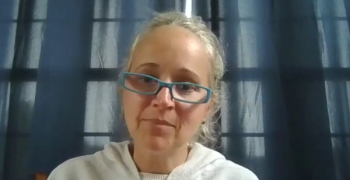
Compared with available literature, the rates of medication-related osteonecrosis of the jaw were higher in patients with breast cancer and bone metastases treated with antiresorptive therapy.

Compared with available literature, the rates of medication-related osteonecrosis of the jaw were higher in patients with breast cancer and bone metastases treated with antiresorptive therapy.

Higher corticosteroid peak dose may worse progression-free and overall survival in several tumor types including melanoma, non-small cell lung cancer, and others.

Increased use of consultations, breast MRIs, genetic counseling, and other testing in high-risk patients were a direct result from nurse-led high risk referral protocols.

Emotional intelligence becomes a critical tool for oncology nurses to sharpen when having difficult conversations with patients who received a terminal cancer diagnosis.

A phase 2 study reveals impactful objective response rates with manageable adverse events in patients with relapsed/refractory follicular lymphoma treated with odronextamab.

A learning approach integrating time series and static data may improve understanding of breast cancer outcomes.

A supplemental biologics license application has been accepted by the FDA for nivolumab plus ipilimumab as first-line treatment for unresectable hepatocellular carcinoma.

Fast track designation has been granted by the FDA to Deltacel with low-dose radiation for pretreated metastatic non–small cell lung cancer.

The Immune Effector Cell Encephalopathy score and keeping a close eye on patients’ symptoms are critical when monitoring for potential ICANS during lymphoma treatment.

Advanced practice providers with independent chemotherapy prescribing privileges reported positive responses related to readiness, confidence, and satisfaction.

A CRL has been issued by the FDA to the biologics license application seeking approval of linvoseltamab to treat some patients with multiple myeloma.

A behavioral intervention led by oncology nurses alleviated dyspnea in patients with advanced lung cancer, suggesting further research for long-term effects.

Early palliative care improved quality-of-life indicators including coping skills, self-management, and 2-year survival rate in adults with advanced cancer.

A multidisciplinary approach to adverse effect management addresses many needs patients with gynecologic cancers may have while undergoing treatment.

Although oncology nurses do not relay the initial information around impacted fertility with cancer treatment, they play an important role in guiding patients with any concerns around this topic.

First-line amivantamab plus lazertinib has been approved by the FDA for locally advanced or metastatic EGFR-mutated non–small cell lung cancer.

Oncology nurses play a crucial role in educating patients about the significance of liquid biopsy in diagnosis and its use in evaluating resistance.

Bintrafusp alfa induced responses in recurrent/metastatic cervical cancer, supporting the need for further research into TGF-β-targeted therapies.

The complexity of postoperative delirium in patients with head and neck cancer may require several strategies including pain management and nutritional support, among others.

The KeyVibe-008 trial evaluating vibostolimab, pembrolizumab, and chemotherapy in extensive-stage small cell lung cancer has been discontinued.

Applying diversity, equity, and inclusion to cancer clinics can help oncology nurses and APPs make an impact on patient care and research.

Genetic testing offers potential benefits after a cancer diagnosis by potentially reducing the risk for cancer in families with hereditary cancer syndromes and managing treatment.

Neoadjuvant durvalumab plus chemotherapy, followed by adjuvant durvalumab, received approval from the FDA for select patients with resectable non–small cell lung cancer.

Compared with chemotherapy, enfortumab vedotin plus pembrolizumab improved survival with no detriment to QOL in previously untreated metastatic urothelial cancer.

An expert explained how oncology nurses and APPs should stay informed on the latest genetic mutations that targeted therapies focus in on for non-small cell lung cancer.

The FDA approved axatilimab for adults and children with chronic graft-vs-host disease whose disease progressed after 2 or more lines of systemic therapy.

A research statement was released by ASCO that highlights 4 recommendations to improve access to clinical trials by patients with cancer.

To improve the well-being of these caregivers and their patients with cancer, oncology nurses and APPs should prioritize cultural competence, language support, and accessible resources.

SON-080, a novel drug, may reduce chemotherapy-induced peripheral neuropathy in patients previously treated with chemotherapy.

Adding IMNN-001 to perioperative chemotherapy enhanced overall survival in patients with newly diagnosed, advanced ovarian cancer.